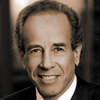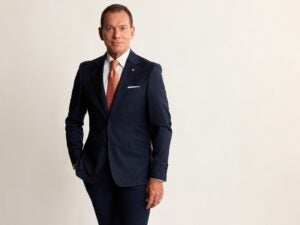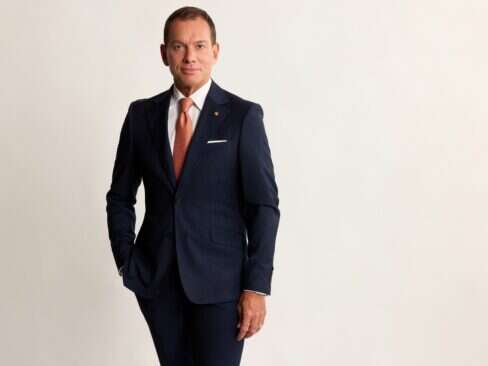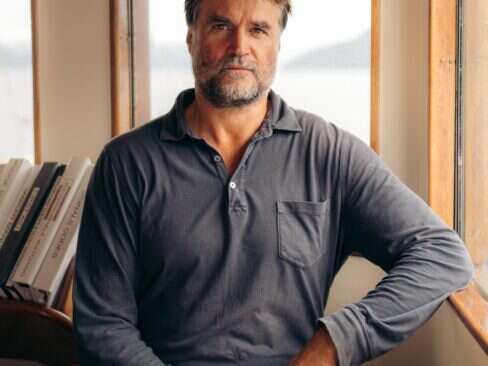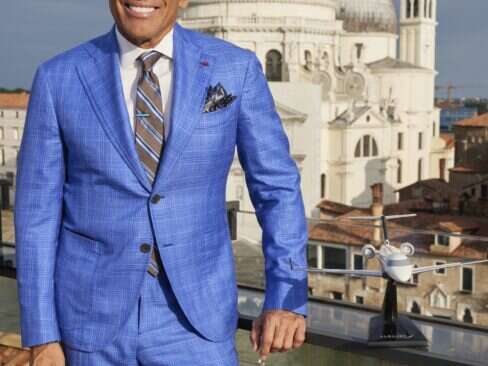
Founder, Chairman and CEOFour Seasons Hotels and Resorts
A child of immigrants, with no background in the hotel business or experience in the ways of luxury, went on to create what most consider to be the world’s most admired and successful luxury hotel chain. How did Isadore Sharp, the founder, chairman and CEO of Four Seasons Hotels and Resorts, do it? This month he explains all in his memoir, “Four Seasons: The story of a Business Philosophy” (Portfolio; May 4 2009). Elite Traveler Editorial Director Laura Hughes previewed Sharp’s engaging story, and spoke with the author about its insights, anecdotes and revelations. During the course of their conversation, Sharp explained why it was time to write the definitive Four Seasons history, how the current recession compares to previous downturns he has weathered over half a century in business, and the degree to which success is determined by corporate culture.
ET: Why did you decide to write the book, “Four Seasons: The Story of a Business Philosophy?”
Isadore Sharp: The number one reason is, you have to do things while you can. The book was done not with the intention of being a book with general public appeal. It has more to do with the history of the company, for employees within the company. Nobody else here today really has any understanding of the very early years and how this all came together. When you have got the final product, that can be taken for granted. But by sharing with people the growing pains that come to make a company, we will give people in leadership roles and on the front line a better understanding of why the company can continue to succeed based upon the principals that have already been established. It’s not a how-to book, but a question of giving the answer of why you do something. And, it’s a question of how long you will be able to recall these things. Had I known the time and effort required to do this thing I might not have started it at all! Now it is finished, and in general I feel it is a worthwhile tool in the company. It shares insight into a thought process.
ET: In your book, you cite four pillars of the Four Seasons business model: quality, service, culture and brand. Near the end you amended it to five. How did you arrive at these guiding terms?
Isadore Sharp: They are really the foundations of what the company has been built on. These are what you identify after the fact. It is a way of classifying the key strategic decisions and milestone objectives. Every year we would make a plan with short and long term objectives. These, in reflection, were crucial to what made the company a success. So the pillars occurred over a long period of time. At the end of the book, I put forward another milestone objective in order to say this is something we should reach for. And that is to become the undisputed leader in luxury hospitality. When we look at what makes the company tick, and the foundations we have relied upon in terms of getting us through, those are the four key, strategic decisions. And each one was done in support of the one before. You come up with an idea, execute it, and find out how to make that idea work. Each one adds to the package that has given the company focus and purpose.
ET: When you and your wife, with two successful hotels in operation, traveled to Europe in 1963 and saw such hotels as London’s Dorchester for the first time, you recalled in the book that you were “just blown away—everything about it was beyond anything I had known.” Do you ever respond that way today when you visit a hotel?
Isadore Sharp: It’s a different feeling. There are more years behind you now. I was young at that stage, and we came from meager upbringings. We had never shared in the glamour or refinements of the quality we were experiencing then. First impressions are really just that, they make the most dramatic impact upon you. You see something and say, ‘We have got to go back and see it again!’ And when you go back, it’s not quite the same. The wonders of the world haven’t changed, but your position in life has. So, first impressions are always the strongest and probably the most memorable. Those were my very first impressions of what we would associate luxury with. It was a different era of life. London then was a world we read about in history, and there we were in the middle of it. We were two impressionable young kids. Having said that, we stayed there at the Dorchester one night.
ET: At what point did you consider yourself a hotelier rather than a builder?
Isadore Sharp: When I decided I could do something that might work in the hotel industry. That was the mid 1970s, after building and opening the Inn on the Park in London. I could see we did something then that excited and interested me. We were competing against the world’s best, and we beat them on their home turf. It was exciting, and it gave me, by comparison to what I was working on many for years, a contrast with the Four Seasons Sheraton in Toronto. Then I saw that perhaps this is what I could do. I enjoyed the experience of building that hotel, and that attitude took hold. It’s not that I didn’t keep building after that—that is how I made a living. The statement I made was, ‘We’re only going to build medium size hotels of exceptional quality and try to be the best.’ The first part of that was no big deal. But to say you’re going to be the best, that was a stretch. I didn’t say, ‘We were the best,’ but said ‘Try to become the best.’ It’s about setting yourself an objective and working towards it. If we could do it in London, build and operate the best, and then specialize at it, we could surely be better at it than other people who didn’t specialize. That’s when I decided to only focus on one end of the market. That was the reason–because it did work in London. So it’s not a reason without meaning behind it. Most things come from your experience, they aren’t wild ideas.
ET: Travelers have come to learn they can rely on a Four Seasons property to provide exceptional service and quality, consistently. Is there any way in which your hotels would be considered trendy too?
Isadore Sharp: We’ve always attempted not to create a style that would depict a point in time, or be reflective of copying something. But everything is done based upon a customer’s perspective. We look at whether they would see it as useful to them and appealing to them. The design always tries to relate to the city and country it is in, and represent what people would expect when they come to that destination. We never tell the hotel’s designers, ‘We want this to be X.’ Instead we would use the designer’s ideas and note that we want to make sure this fits within this community, saying, ‘What do you think?’ When you hire creative people, it is best not to put them into a box. They see and do things we can’t see. We bring them back to earth sometimes. But the idea is to use people’s strengths when they apply. Then we stay away from themes, or stylized hotels. Therefore, you’ll see Four Seasons hotels that range from traditional and classic, to extremely cutting-edge and modern. It’s not a matter of style, just quality that would fit with indigenous surroundings.
ET: Early on, you recognized that your company had to create a new management philosophy in the hotel business in order to motivate every employee to deliver five-star service. How did you establish that new culture?
Isadore Sharp: It is very difficult if you are dealing with a large company and then want to impose a service culture that is new. When I said we’re going to be the best, the question became how do you become the best? We couldn’t through architecture and décor, because what you do today won’t be as impressive in five years. So we focused on what this business is all about: People serving other people when they are away from house and home. So the second idea—service–would distinguish us, and it follows the first, which was to be the best. So, if service distinguishes you, it only works if it comes through the people who work in each hotel. Could we create a workforce that would distinguish us from our competitors? That was a question. I found the answer in a theory: If we could create an environment that would give employees a sense of purpose and meaning to their job. So the job would not just represent their daily bread. So that idea, of creating a corporate culture that would in fact give people a sense of purpose that they could believe in and work towards, was using the Golden Rule as a simple statement and commitment.
The company was small then, so we could mandate that this is how WE are going to behave. The senior people in this company are going to deal with people through respect, integrity and trust, and through our actions we expect you to do the same. The executives could demonstrate through our actions what we meant. Once the company had grown, it became a difficult time, and some people couldn’t live with that honestly. There was a very difficult time for the company because some very qualified, competent people didn’t act in a way that would give others the opportunity to rise to their best selves. It was not about command and control, but acting as a coach. That took a long time, to understand that it’s not what you say, it’s what you do. Building that culture into the company was all based upon an ethical credo. Could we create a workforce that would be different than others based upon an ethical credo? That was a theory. Now, over years, by practice, it has become a fact. People have been averaging 15 to 20 years with the company. By their own actions they know it works. That’s how it becomes a very powerful tool. If you take a company with 40,000 employees, you can’t get it down to the base of that triangle. But it was different for me when we were a very small company. Everyone buys in, not by the power of your position, but by the respect that you earn. That gives you influence to become an effective leader. People do as you say when you are the boss. But that’s as far as they will go. But give people an opportunity to participate in a way they will want to prove to you, and they will do more than you ask. Do you know anyone who wants to fail? No. We all want credit and recognition since we all have egos. So we try our best if we are in an environment that responds to that type of effort. It would be very hard to go into a company today and say, ‘Look at Four Seasons. They have a good service culture. Let’s try it.’ It’s taken us 40 years, and it takes a commitment through good and bad times not to change. You demonstrate principals more forcefully through bad times, and it shows that you are willing to stand on values.
ET: In the book you write that in 1981, you “saw the recession less as a mishap than an opportunity…we’ll hold firm on pricing.” Do you see a similar opportunity in today’s economy?
Isadore Sharp: It is more extensive today, and more frightening. Because of this uncertainty, and that it is a global recession. Before, recessions affected parts of the world, but they didn’t blanket everyone into the same downward spiral. But this recession is the same in terms of what you have to do to get through it. It is more difficult now that there are no good spots to help you in other places.
But peoples’ attitudes today are not much different than then. Frugality becomes king, everyone wants to show they are reducing costs as best they can and not being ostentatious in their habits. Perspective plays a big part in the decisions that individuals and companies make in order to show they don’t have people in their company causing this pain, particularly when there are terminations or reduced hours involved. So perception is a very important part of managing through this process. That’s the same, and this does pass. Because by nature, people do not go backwards in lifestyle. They aspire to a level and continue to improve. When it settles down, people will become more normal; not back to the way they were, but they will adapt and adjust to what they learned and move forward in a normal way. It will take longer to come out of this recession, and probably go even deeper because this financial crisis is unheard of. But when it settles down, we will become normal again. The tendency is for people to improve their lifestyle.
ET: How has the Four Seasons guest changed over the last half century?
Isadore Sharp: The clientele has expanded. Years back, with grand old hotels, it was very much a class society. Today it’s not that way at all. You use the word luxury, but that terminology doesn’t necessarily reflect what we are. Look at the cost of our product versus our competitors’ product, and we are talking about hundreds of dollars, which is not extraordinary in terms of pricing for a luxury product. Talk about other types of luxury products, and you find a difference of tens of thousands of dollars between various watches, for example. So our customers really represent a range. Yes, we have people who can afford anything. And we also have the aspiring crowd, those people who look to enjoy occasionally. So the market has increased in depth and breadth. The world’s demographics, and the world of commerce, have grown so dramatically. Look at the population of India, Latin America and Asia, they have grown dramatically, and most industries are growing because of that. Our industry is a very strong growth industry, and it’s not like something is going to replace this business. Today travel and tourism employs maybe more people than any single industry. As a result, every niche of the market is bigger. Our customers’ habits have changed of course, in terms of the way they travel, dress, think of informality, or their experience in restaurants. Today, restaurants are a branded product. People think of going out to a restaurant as an evening of entertainment.
ET: Where do you travel for leisure?
Isadore Sharp: I don’t really travel for pleasure. I have a home in Palm Springs. That’s where we go to for respite. Travel is an enjoyable part of what I do. I don’t ski anymore, so my pleasure is staying home while travel is part of my work.





